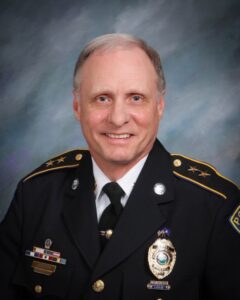
Donald Anderson, Darien’s Chief of Police, will be talking about a subject of current interest, policing in the year 2020 and beyond. Chief Anderson has been a member of the Darien Police Department since 1983. He was promoted to the rank of Sergeant in 1999, Lieutenant in 2000, and to his previous rank of Captain in 2013. Before his promotion to Chief of Police in 2019, he held the position of Captain of the Administrative Services Bureau. He holds a bachelor’s degree in criminal justice from Sacred Heart University and a master’s degree in criminal justice from Iona College. He is also a graduate of the 245th session of the FBI National Academy, is a state-certified Motor Vehicle Accident Investigation Instructor, and also served as a member of the Detective Division and the Specialized Accident Investigation Team.
Arranged by Bob Fiske
Bryan Hooper’s summary of the talk:
Don Anderson, Darien Chief of Police, joined the force in 1983 and rose through the ranks to become Chief in 2019, following in the footsteps of his father, Bruce Anderson, who was Chief of Police in the years 1988-1993.
Chief Anderson stressed that the Darien Police Department closely follows the guidance from the State of Connecticut regarding training and oversight of officers. Darien also achieves its exemplary record through good hiring policies which ensure the town has professional, competent personnel. He stated that all incidents involving use of force must be reported: last year, Darien had only thirteen cases, and none of them involved “excessive force.” Similarly, officers must report occasions when a taser is pulled out, and no tasers have been used in the past four to five years. All interactions with the public are recorded by a body or a dash-camera for mutual protection of the public and the police, and to maximize transparency.
Moving to the national situation created by concerns about cases of police brutality, Chief Anderson addressed some of the points raised by Campaign Zero in their suggested steps to address policing via the “8 can’t wait” tenets:
- DPD banned the use of chokeholds and strangleholds 25 years ago, with the caveat that they could be used to defend yourself in extreme situations. For the same length of time, the force has been training officers in cases involving positional asphyxia or excited delirium to cope with “can’t breathe” situations.
- De-escalation of domestic violence and mental health confrontations are another part of existing training, and the DPD involves professionals in both areas whenever possible.
- Warning before shooting is already applied, and Chief Anderson emphasized that weapons are to be used only as a last resort.
- Duty to intervene is also laid down as a standard to apply if officers see a colleague using excessive force, and was enforced in the DPD even before it became part of the recent Connecticut police reform bill.
- Shooting at moving vehicles is barred by the DPD.
- Comprehensive reporting is already required by the DPD.
Chief Anderson also commented on the part of the Connecticut legislation that eliminated “qualified immunity” for police officers, and said that it will remove the safety net that police had when resolving incidents effectively through taking rapid action, and could lead to more lawsuits against them. He is hopeful the legislature will modify this part of the bill in the future to avoid the loss of some professionals.
He addressed a number of questions from the membership for 45 minutes, and these can be viewed with the rest of his talk by clicking on the following URL link: https://www.youtube.com/watch?v=jMeIalgfKxQ&feature=youtu.be.
Chief Anderson said that he is “always available to answer any questions or offer follow-up on Darien Police Department operations.” Finally, in light of the increase in car thefts from driveways, he made a plea to his audience to “Lock your car everywhere, every time!”
